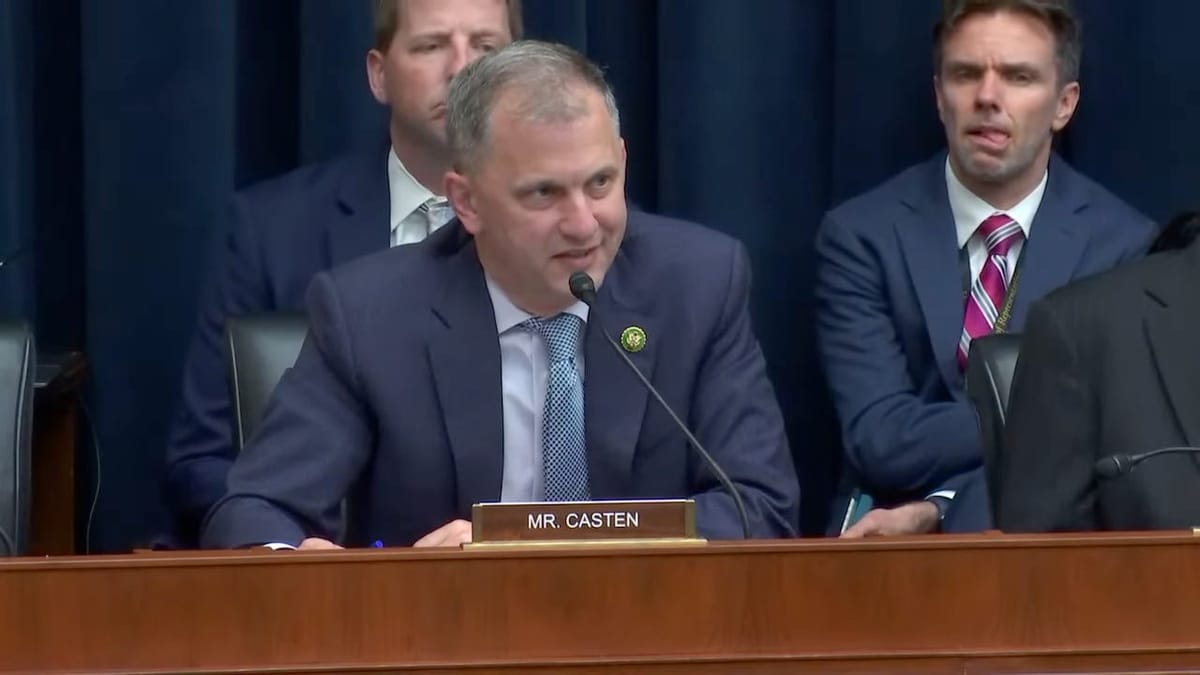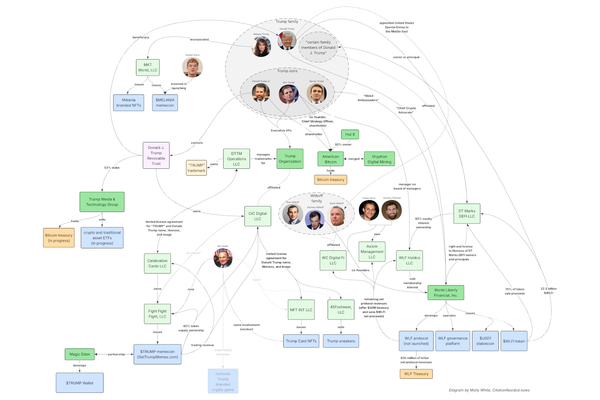Issue 28 – Force majeure
A $100+ million grift week also featured Grumpy Cat cease-and-desist NFTs, eyeball black markets, and a rumored team arrest.

This was the week of the crypto Ponzi, as two apparent schemes collapsed and left more than $100 million of damage in their wake. But first, some updates on the crypto space more broadly:
In government
In the US
The most recent Congressional hearing on crypto was May 18th's "Putting the 'Stable' in 'Stablecoins:' How Legislation Will Help Stablecoins Achieve Their Promise". The title belies the outright acknowledgment from some Congresspeople that the so-called "payment stablecoins" they're so interested in are tokens that are not really used for payments, and are not always so stable. For some reason, the bills' proponents hope that enough legislation will suddenly morph these tokens into something they have never been. This is a backwards way of going about things when, instead, we should look at the problems we're trying to solve and then create and evaluate solutions from that perspective.
Most of the hearing was spent listening to crypto industry advocates — in and outside of Congress — wax poetic about what blockchains might possibly, one day, hopefully, maybe achieve. There was one rather schadenfreudian exchange, though, when Rep. Casten (D-IL) grilled venture capitalist Matt Homer about the popular crypto VC model of dumping tokens on retail investors to make a quick profit at their expense.
In the UK
The UK Parliament's Treasury Committee has released a report suggesting that the cryptocurrency industry should be regulated like gambling, rather than as a financial service:
51. Regardless of the regulatory regime, their price volatility and absence of intrinsic value means that unbacked cryptoassets will inevitably pose significant risks to consumers. Furthermore, consumer speculation in unbacked cryptoassets more closely resembles gambling than it does a financial service. We are concerned that regulating retail trading and investment activity in unbacked cryptoassets as a financial service will create a 'halo' effect that leads consumers to believe that this activity is safer than it is, or protected when it is not.
52. We strongly recommend that the Government regulates retail trading and investment activity in unbacked cryptoassets as gambling rather than as a financial service, consistent with its stated principle of 'same risk, same regulatory outcome'.
In the courts
Last week, I mentioned that Do Kwon, the CEO behind the collapsed Terra project, had been granted bail of €400,000 (~$435,000)1 while awaiting trial on charges of document forgery in Montenegro. Now, following an appeal by prosecutors, his release has been yanked. The prosecutor successfully convinced the judge that the bail amount would not serve to deter Kwon and his companion from running once released, and that they would have no reason stay in the country where they are awaiting extradition.a
The Web3 is Going Just Great recap
There were 12 entries between May 16 and May 24, averaging 1.5 entries per day. $119.08 million was added to the grift counter.
Tornado Cash DAO is hijacked
[link]
The Tornado Cash DAO is the controlling entity behind Tornado Cash, a cryptocurrency tumbler that was at one time the most popular way to try to anonymize crypto transfers — at least until some OFAC sanctions in August 2022 put a bit of a damper on things [W3IGG]. The project carries on, though, and is still rather frequently used to tumble crypto transactions despite the sanctions.
On May 20, an exploiter submitted a malicious proposal to be put to a DAO vote. Although it ostensibly would have penalized cheating participants in the network, the proposer also snuck in an extra function. After the proposal passed, the exploiter used that function to grant themselves 1.2 million votes, which gave them majority control. The TORN tokens used for voting also have monetary value, and altogether the attack is estimated at $1.1 million.
The attacker has already sold some of the TORN tokens for ETH. Amusingly, they covered their tracks afterwards by laundering the funds through… Tornado Cash.
On May 21, the attacker submitted a new proposal to the DAO that appears as though it will restore the state of DAO governance by resetting the attacker's token balances to zero. The DAO has no real choice over whether the proposal is executed, given that the attacker still has majority control of the project. Some have expressed optimism about the seemingly merciful proposal, which could allow the DAO to carry on after the attack. Others, however, have expressed skepticism, speculating that it might just be an attempt by the exploiter to pump up the TORN token price so they can make a heftier profit.
Multichain freezes up, team goes silent as arrest rumors swirl
[link]
Beginning as early as May 21, users of the Multichain blockchain bridge began to report that their transactions to bridge assets from one chain to another were getting "stuck" in transit. The Multichain project acknowledged that there was an issue in a support post on May 23, where they wrote that a back-end node upgrade was "taking longer than expected". The following day, the project tweeted that parts of the protocol were "unavailable due to force majeure, and the time for service to resume is unknown". That was the last substantial update from the project on Twitter or via their other channels.
Meanwhile, unverified rumors have swirled on social media that the Multichain team has all been arrested in China. The team's silence and the ongoing issues with the protocol have begun to make people antsy, and some have taken action. On May 24, the Fantom Foundation withdrew nearly 450,000 $MULTI (~$2.4 million) that they were providing in liquidity on SushiSwap. Other large holders began moving $MULTI around and selling it off, as well. On May 25, Binance announced that they would be suspending deposits for bridged Multichain tokens "while [they] await clarity from the Multichain team".
While "force majeure" would be a hilarious way to describe a simple technical SNAFU by the Multichain team, the ongoing radio silence around the arrest rumors may suggest something more serious.
Meanwhile, the fears around Multichain seem to have metastasized to Fantom, which is closely linked with Multichain and stands to be heavily impacted if the issues with Multichain are more severe.
"The director went crazy and spent all the money"
[link]
An apparent Ponzi scheme has gone belly-up in Croatia. BitLucky was a company that promised customers it would invest their money into cryptocurrencies, promising red-flag-waving 5–25% monthly profits. Those customers were surprised to receive an email on May 19 in which the company's director, Luka Burazer, explained frankly that "with a series of bad trades and decisions, unfortunately, I have brought the state of the company into a crisis situation". He and the company's co-founder haven't been contacted since, and have apparently turned off their phones. However, a secretary contacted by some BitLucky investors reportedly gave their frank evaluation of the situation: "the director went crazy and spent all the money".
The losses allegedly involve crypto assets notionally worth €70 million (~$75.7 million), and affect at least 700 individuals.
Everything else
- Morgan DF Fintoch likely exit scams for around $31 million [link]
- Brand new $CS token exploited for almost $700,000 [link]
- Croatian cryptocurrency investment company BitLucky reportedly collapses; more than $75 million allegedly missing
- WDZD Swap exploited for $1.1 million [link]
- Around $110 million "stuck" in Aave protocol on Polygon due to a bug that can't be fixed for a week [link]
- Phishing-as-a-service company "Inferno Drainer" steals assets nominally worth $5.9 million in three months [link]
- Grumpy Cat trademark owner sends cease and desist via NFT over unauthorized "Grumpy Cat Coin" [link]
- Coin Cafe to pay $4.3 million restitution after instituting high fees without informing customers [link]
- Swaprum decentralized exchange rug pulls for almost $3 million [link]
- Sam Altman's Worldcoin project incentivizes a black market for biometric data taken from people in developing nations [link]
Worth a read
In their weekly newsletter, David and Amy provide a useful breakdown of some news around Tether, and how journalists are being perhaps a bit too credulous with an organization repeatedly shown to be shady. "[J]ournalists, even finance journalists, keep being unprepared for brazen fabulists from the crypto world. They keep assuming basic competence." There's other news in there too (some of which is also mentioned in this newsletter), but I particularly appreciated the Tether portion.
With Worldcoin popping up in the news again, people should be aware of its rather odious history. The strategy on the company's part seems to have been to go mostly dark for about a year after the damning reporting from MIT Tech Review and BuzzFeed News, then pop back up to hop on the AI hype train just in time to raise another huge funding round.
That's all for now, folks. Until next time,
– Molly White
Footnotes
Some sources are reporting that the bail was €800,000. This seems to be the combined bail amount for both Do Kwon and his companion who was also arrested. ↩




